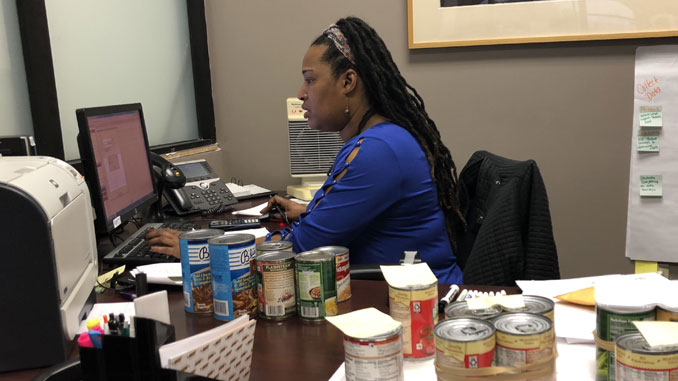
By Brandon Brown
Almost everyone has been there. Days turn into weeks, and weeks turn into months. Eventually, failure to return one borrowed book from a library means that resource is no longer available to the average resident. Now, libraries across the United States have begun to change the policies that punish forgetful or unfortunate borrowers.
“It’s also in a way geared towards helping with retention as well. You know ‘hey we don’t have to pay fines over there!’ that’s a plus,” said Ashaki Haroon, the User Services Supervisor at Xavier University’s library, which offered a “food for fines” alternative to encourage delinquent borrowers to return overdue check outs.
In the past, penalties resulted in suspensions of the library card of the offender, or libraries completely block these individuals from using any of its resources which can range from access to the internet to catalogues of recent and classic movies and records. In some cases, public libraries are concerned that fines may alienate segments of the population who need the free educational resources the most, but simply cannot afford the late fee that is owed, no matter how small the price is. These policies affect low-income families and students who rely on these public places for educational resources the most, and libraries want to change that.
The implementation of “fine free” policies is meant to be a solution for those in the community who may be prevented from using their local library resources due to outstanding fines. The campaign also has been trending under the hashtag #FineFreeLibraries. The message is for libraries to consider alternatives for fines imposed upon delinquent borrowers. Some have suggested having public reading or poetry days for kids to engage in learning, in exchange for removing their fines. Proponents of fine free libraries say that a $10 fine is sometimes the difference between groceries or gas for some family households.
Here in the city, on college campuses, many students return home at the end of the school year, ashamed or unable to pay a fine. Xavier’s librarians say the option is offering their students an opportunity to feed the community as well as clear their debt with the library for a fraction of the price.
“The students are benefitting from the drive by having their fines alleviated, but they’re also helping families who may not have enough food or money for food around the holiday season. It’s a win-win situation for students and the community,” Haroon said. This campaign is one of the first steps Xavier University’s library is taking towards a “fine free” library.
The library resource team thinks the campaign, Food for Fines, would be a better way for Xavier students with outstanding fees to affordably pay their debt. Their “food for fines” campaign allow library fees that students accumulate to be paid with canned goods.
Some students also carry excess points on their meal plans or have left over shelf food at the end of the school term. With “food for fines,” they can use a resource they already have at their disposable to ensure access to a resource they need for their education, Haroon explained.
For residents who use public libraries, they too can use leftover or shelf goods in exchange for eliminating their fines and fees, according to proponents of the #FineFreeLibraries campaign.
The canned goods used to clear students’ library fees are then donated to local food drives in the area such as the Second Harvest Food Bank. These food banks can always use the extra donations, particularly around Christmas time, when these families are especially in need of any help provided, according to Second Harvest staff.
“It is a good idea because instead of giving to Xavier, I can give to those in need,” said Sarena Witherspoon, a communications senior at Xavier. “A few bucks is a drop in the bucket for a university, but a meal can make all the difference for someone who needs it.”
Recommended For You.
















Be the first to comment